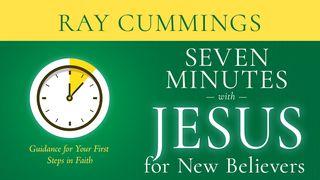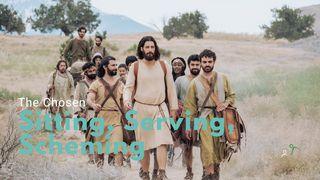Stripped: Trusting God When He Allows Others to Hurt Youಮಾದರಿ

Up to this point in Joseph’s story, it’s been 11 years (for us, three chapters) since he was sold by his brothers. We don’t know how those years were split into slave vs. prisoner, but when the story picks up, he’s busy with his usual administration duties when two of Pharaoh’s officers are brought to the prison and assigned to him. The king’s chief cupbearer and the chief baker had offended him and were sent to jail temporarily.
This part of the story amazes me. Even though Joseph was favored and blessed by God as a slave and a prisoner, he had no idea what God had been up to all this time. We have no record of an angel or messenger being sent to encourage Joseph. He didn’t receive a prophetic word at a prayer meeting at church, or read a motivational book, or listen to podcasts. He was oblivious to the fact that the interaction with those two men would be instrumental in his life in a few years.
Why does it take God so long to move his pieces into place? Time is deceptive—for us, it’s an eternity; for Him, it’s a blink. Moreover, even though He sees time differently than we do (2 Peter 3), He operates within the constraints of human time. When we are waiting for an answer, we may forget that our stories are not the only ones keeping heaven busy.
There was an old commercial I did not like. It portrayed an attorney speaking to people with a financial situation of some sort through their TV, informing them about their deserved cash and how to get it. That TV interaction instigated an epiphany and determination in the client to claim their money by shouting: “It’s my money, and I need it now!” Then other people would pop out of windows like whack-a-moles and scream loudly, “It’s my money, and I need it now!” It was terrible.
Sometimes we have that same attitude with God. We want to scream out a window, “It’s my need, and I want it filled now!” We can be led into the deceitful mindset that God is not listening to our prayers simply because the answer doesn’t arrive immediately. Surely, Joseph had days when he wanted to poke his head out of the prison and yell at the top of his lungs “It’s my life, and I want it back now!” but he would soon learn that even menial days can be part of a grandiose purpose.
THE GIFT 2.0
Suddenly, a crucial element reappears in the story: dreams and their interpretation. The cupbearer and the baker had disconcerting dreams on the same night. When Joseph asked them why they were sad, they told him they had dreams, but no one to interpret them.
Joseph’s heart beat faster as familiar sentiments flooded his soul. The last time he interpreted a dream did not end well. He had lost more than a few nights regretting sharing his dreams with his family and making mental promises to no longer let his dreams carry him away impetuously. But that was before he had an augmented capacity for understanding and using his gift:
“...Don’t interpretations belong to God? Tell me your dreams” (Genesis 40:8b, CSB).
Joseph had gained humility and insight: the gifts God gives us are His and not to be used for our hidden agendas or our glory. Fear and past traumas could have kept him quiet and reluctant to help the men. But this was his unavoidable, unsilenceable gift… version 2.0.
Now, if the baker or cupbearer had shared their dreams with me, I would have shrugged them off as crazy, meaningless dreams. However, God gifted Joseph with this ability as a fundamental part of the preparation and training for his destiny.
Joseph had complete confidence that he interpreted correctly. He had no doubt about what would happen three days later, which is why he didn’t ask the baker for any favors, since the poor guy was a dead man walking. Finally, after all those years, he found a way to send a message to the most powerful person in Egypt! Certainly, Pharaoh will listen to my story and get me out of this dungeon.
THE VOLUNTEER EFFORTS
Enter our premeditated efforts to help God move things along. I have done this so many times it ain’t funny. We pull at whatever loose string we find, attempting to coordinate our breakthroughs through our efforts, contacts, and connections. I am not saying that working hard and making contacts is wrong. I am addressing specific moments when, in a blinding desire to get out of our meantime, we forget we can rely on God completely to open or close doors when it’s the right time and we volunteer the extra help to force them open.
Anything that looks like an opportunity makes the mind race a million miles per hour. In just a matter of minutes, we cook up an elaborate plan with everything down to the acceptance speech we’ll give at the Oscars mapped out. Could this be the opportunity I’ve been waiting for? Is this my turning point? Am I finally going to walk into my destiny?
If ever there was a time for Joseph to be sleepless, this was it. The mental conversations he had with Pharaoh kept him awake, eager to take advantage of the opportunity God provided. It had to be God, right? Absolutely. It was God, but it wasn’t God’s timing… yet. It was a move on the chess board, but not time for checkmate.
Sure enough, the cupbearer recovered his position, and the baker was killed. But for Joseph, those three days turned into an uneventful week… three months… a year… his hopes of getting out of jail dimmed with each passing day. The cupbearer simply forgot him. He’s not only been stripped, he’s been forgotten, again. Back in the literal pit.
It’s a terrible feeling to be forgotten, but highly likely to occur in the meantime. However, this does not mean God is playing tricks on you or that He doesn’t have purposes and plans, it just means it’s not the right time and, in some cases, maybe not His plan either.
God was going to get Joseph out of the dungeon, but it wasn’t going to be through Joseph’s efforts. Joseph needed to understand that Pharaoh was not in charge of his life and getting him out of jail. He was exactly where he needed to be even though he couldn’t see it. The God he served was greater, bigger, and more powerful than any king, and it would be through His planning and in His timing that Joseph would get out.
The particular gifts God gives us are integral to the plans He has with and for us. They’re not just random talents, they are part of the plan. Your talents are part of the plan.
In the meantime, our faith matures into faith that doesn’t follow God only when it’s convenient (“It’s my money and I want it now!”), rather one which continues pursuing Him when all that you ever dreamed of and hoped for is gone.
Some people measure spirituality by the way you talk, if there’s anointing (this is especially true in my culture). But in my close to 40 years of following Christ, I’ve come to understand that spiritual maturity is displayed in our actions and ability to praise and love God through disappointments, loss, stripping, and the loneliness of being forgotten.
We are not exempt from doubts or grueling days. When learning to distinguish God’s voice, we will make mistakes, misinterpret dreams and things we thought God was telling us to do—it’s all part of this thing called life.
Our life on earth is but a blink in eternity. We must learn to trust His sovereignty above our need to have an explanation for everything.
Friend, you can be blessed in the land of your suffering. The gifts and talents in your life are part of His plan and design for you. No one can thwart His plans for you. Don’t give up, don’t lose hope. Serving the God of the dream is greater than chasing the dream.
Others might forget you, but God has not forgotten you. This devotional might be one of the ways He reminds you of His nearness. He is always working in our favor, even when we don’t see it. He’s a tailor busy at work, and when you least expect it, He will reveal something beautiful.
To meditate:
- Can you identify with being forgotten? How has that impacted your faith and attitude towards God and others?
- What are your gifts and talents? Looking back over your life, have you seen them change and improve to a version 2.0 or more?
- Have your dreams become more important than the God of the dream?
- What are some signs that God is near you despite feeling forgotten?
ದೇವರ ವಾಕ್ಯ
ಈ ಯೋಜನೆಯ ಬಗ್ಗೆ

Using Joseph’s dramatic story as the framework, Stripped addresses the struggle to reconcile God’s love with inflicted pain. If He loves us, why does He allow others to hurt us? It addresses how to find hope and intimacy with God, despite the pain of being stripped, trust in His plans and power to redeem our stories, be successful in the land of our suffering, and forget, fructify, and forgive. This devotional is adapted from the book "Stripped: Trusting God When He Allows Others to Hurt You" by Karenlie Riddering, available on Amazon and Kindle.
More
ವೈಶಿಷ್ಟ್ಯದ ಯೋಜನೆಗಳು

4 Bible Characters Who Found Themselves in Between

Horizon Church January Bible Reading Plan: The Book of Proverbs - the Way of Wisdom

A Daily Journey Through the Word – Bible in One Year

The Power of God's Blessing

LIVE SENT | 21 Days of Prayer and Fasting

Safe and Secure in Christ - 1

Who Am I?

Praying From Victory, Not for It

Seven Minutes With Jesus for New Believers: Guidance for Your First Steps in Faith
